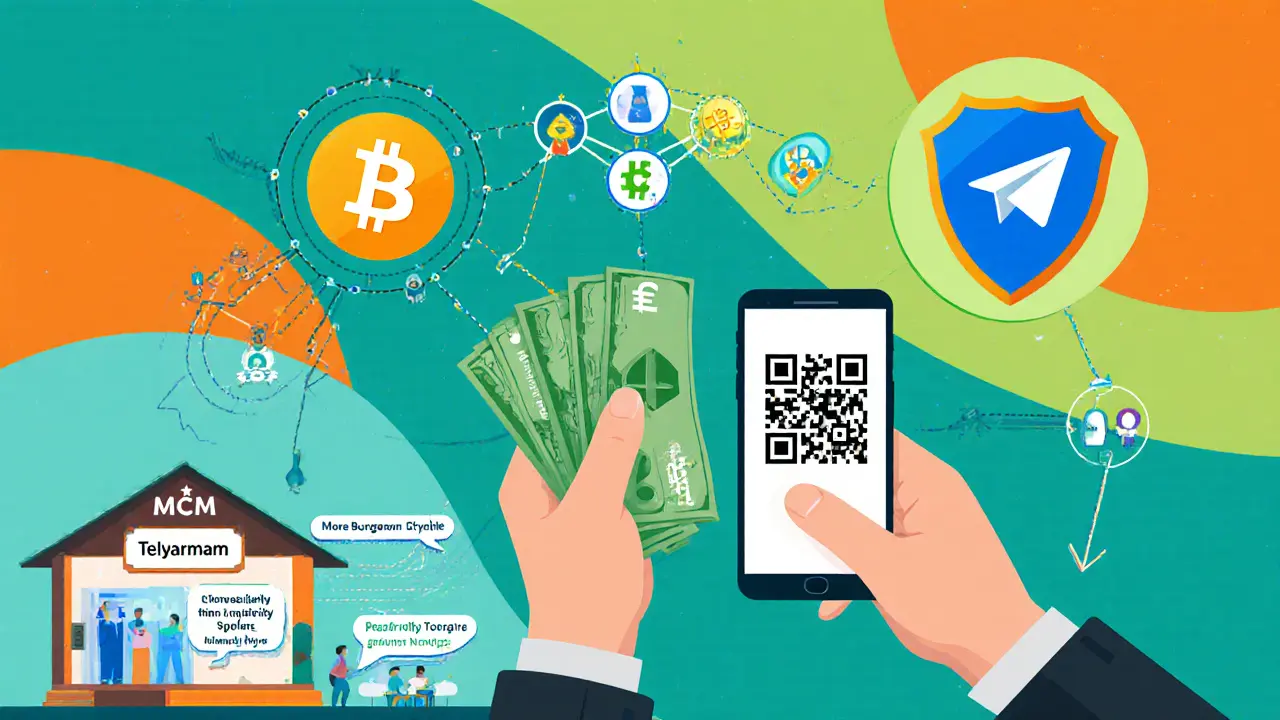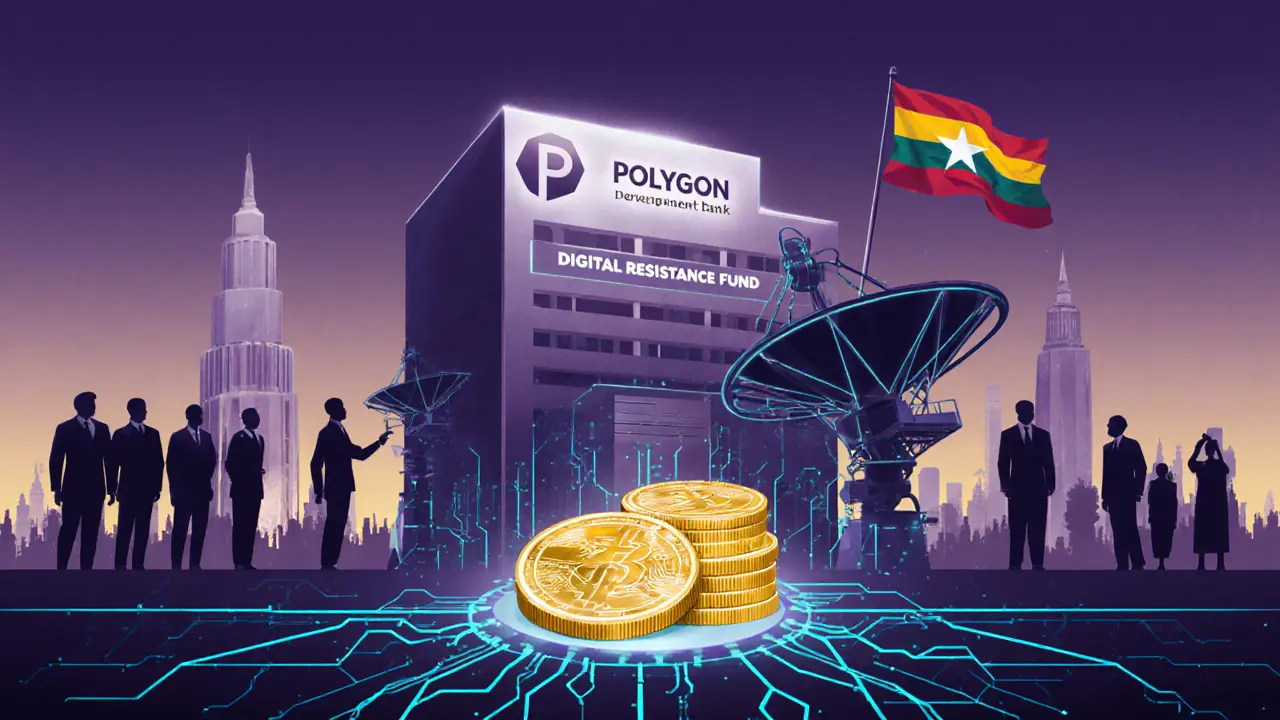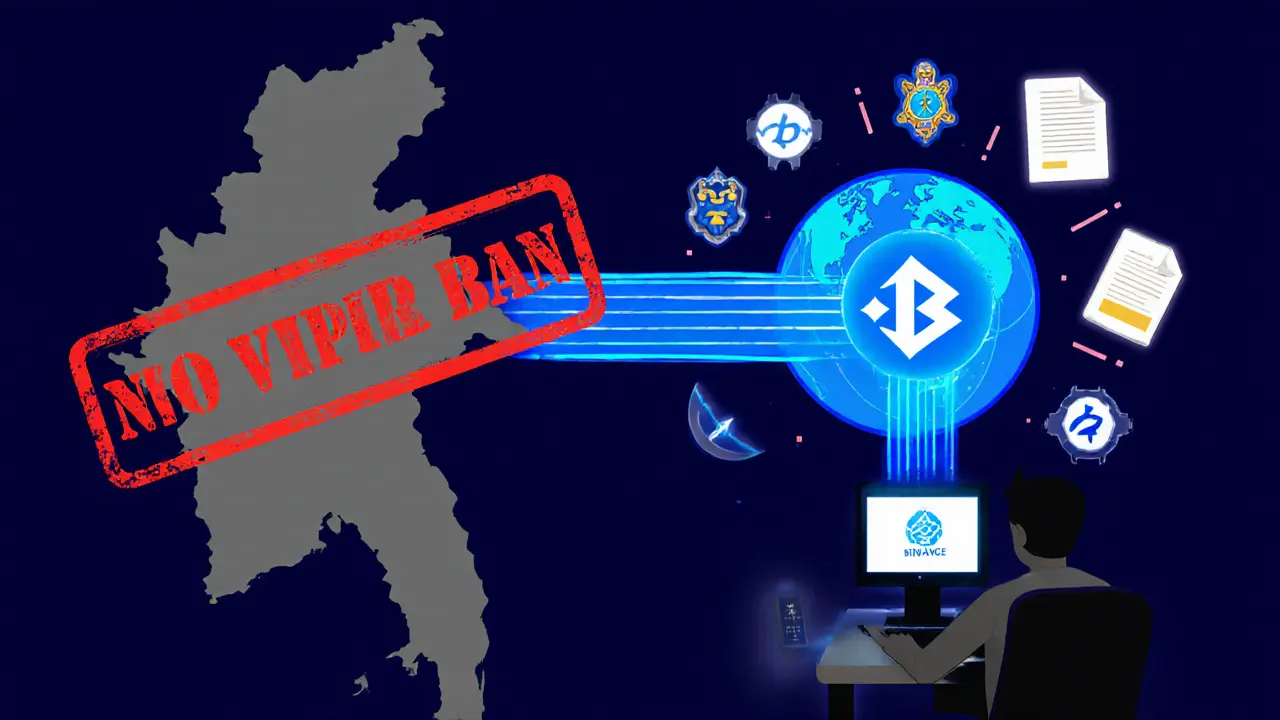Myanmar Crypto Market Risk Analyzer
Important Disclaimer
This tool provides educational insights about risks in Myanmar's underground crypto market. Participation in such activities carries significant legal and financial risks. Always exercise extreme caution and consider consulting legal professionals before engaging in any cryptocurrency activities in Myanmar.
Quick takeaways
- The Central Bank of Myanmar banned all crypto activity in 2020 and still enforces it heavily.
- Traders rely on VPN‑accessed foreign exchanges like Binance and on peer‑to‑peer networks on Facebook and Telegram.
- The Myan Crypto Masters Community (MCM) provides the bulk of Burmese‑language education.
- Liquidity is ultra‑thin, so large orders cause wild price swings.
- Stablecoins such as USDT are the go‑to vehicle for remittances and political financing.
Myanmar underground cryptocurrency market is a covert ecosystem that has sprouted despite a total ban on digital assets imposed by the Central Bank of Myanmar in 2020. The military‑run regime treats every crypto transaction as a violation of foreign‑exchange rules, freezing bank accounts and filing criminal charges when it catches a trader. Yet, because traditional banking is scarce and the country faces severe cash shortages, people keep turning to digital assets as a way to move money across borders, hedge inflation, or support resistance groups.
Below you’ll get a plain‑spoken walk‑through of how the market works, who the main players are, what risks you face, and why the scene persists even under the harshest enforcement. Myanmar crypto underground is not a myth - it’s a living, breathing network that blends tech savvy, community spirit, and a constant fight for financial freedom.
Regulatory backdrop: a blanket ban that fuels the shadow market
In March2020 the Central Bank of Myanmar issued a proclamation declaring cryptocurrencies “unrecognised and unregulated”. The move locked down three legal instruments:
- Foreign Exchange Management Law - criminalises any conversion between digital tokens and foreign currency.
- Financial Institutions Law - reserves the issuance of any monetary instrument to the state.
- Anti‑Money‑Laundering (AML) Act - gives authorities power to freeze accounts and prosecute traders.
Since then, the ban has stayed in place under the military regime, which views independent finance as a potential threat to its power. Enforcement focuses on large‑scale traders and organized exchange operators, while small peer‑to‑peer swaps often slip through the cracks. This selective pressure has created a two‑tiered reality: an official black‑and‑white prohibition on paper, and a bustling, informal market in reality.
How traders get around the ban
There are three main pathways for Myanmar users to touch crypto:
- VPN‑accessed global exchanges - Binance remains the most popular platform because it offers a wide range of coins and a relatively smooth KYC‑bypass when users connect via VPNs. Traders set up a foreign bank account (often in Thailand or Malaysia) to fund Binance, then move the crypto back into the local grey‑market.
- Peer‑to‑peer (P2P) groups on social media - Facebook groups and Telegram channels act as the marketplace floor. Sellers post price quotes, buyers DM them, and a trusted “cash dealer” meets in person to hand over cash for a crypto wallet transfer.
- Unofficial local exchanges - A handful of tech‑savvy entrepreneurs run private order‑books that match buyers and sellers directly. These platforms lack any legal status, so they rely on reputation scores and escrow bots built into Telegram.
The reliance on cash dealers means liquidity is razor‑thin. A single order of 5BTC can shift the market price by more than 15%, simply because there aren’t enough counterparties to absorb it. This volatility is both a risk and an opportunity for seasoned traders who can arbitrage between Binance’s global price and the local P2P quotes.
Community backbone: the Myan Crypto Masters Community
The biggest knowledge hub is the Myan Crypto Masters Community (MCM). Founded by a pseudonymous figure known as “Feliz”, the group now counts more than 23000 Burmese‑speaking members. MCM runs weekly virtual workshops, publishes step‑by‑step video guides on TikTok, and maintains a searchable FAQ on a private Telegram bot.
Why does MCM matter? Because most crypto literature is in English, and the language barrier leaves many users vulnerable to scams. MCM translates concepts like “hardware wallet”, “staking”, and “gas fee” into everyday Burmese, using analogies that resonate - e.g., comparing a hardware wallet to a “digital safety deposit box”. The community also vets cash dealers, assigning reputation scores based on past transaction histories.

Market characteristics: thin liquidity, wild swings, and stablecoins
The underground market’s anatomy can be summed up in four points:
- Liquidity - Daily trading volume is estimated at under $30million, a fraction of Thailand’s $300million. Small trades (<0.1BTC) go through quickly; larger trades linger for days as dealers search for counterparties.
- Volatility - Price gaps of 10‑20% between Binance and local P2P rates are common. News of a crackdown or a high‑profile scam can double the spread overnight.
- Stablecoin dominance - USDT and USDC are the preferred bridge for remittances because they hold value against the shrinking kyat and can be swapped for local cash without attracting as much regulatory attention.
- Risk exposure - No legal recourse, no consumer protection, and constant threat of account seizures by the Myanmar military regime.
Regional regulatory comparison
| Country | Legal status | Main enforcement agency | Typical user experience |
|---|---|---|---|
| Myanmar | Complete ban (illegal) | Central Bank of Myanmar | Underground P2P, VPN‑accessed exchanges, high risk |
| Thailand | Regulated (licensed exchanges only) | Bank of Thailand | Legal exchanges, KYC required, moderate risk |
| Laos | Permissive but unregulated | Ministry of Finance | Few local exchanges, growing P2P scene |
| China | Ban on trading and mining | People's Bank of China | Strict crackdown, underground activity concentrated in border regions |
Myanmar’s outright prohibition is the strictest among its regional peers, which explains why the underground market is both fragile and surprisingly resilient.
Real‑world risks: scams, arrests, and lost capital
In 2022 a high‑profile “crypto yield farm” promised 300% returns on USDT deposits. Within weeks, the operators vanished, leaving an estimated 15000 investors - mainly students and small shop owners - with nothing. The case sparked massive panic on the MCM forums, prompting the community to launch a “Scam‑Watch” channel that now flags suspicious offers in real time.
Legal repercussions are not just theoretical. In 2023, three cash dealers were arrested in Yangon after a joint operation with the Central Bank of Myanmar. Their bank accounts were frozen, and they received up to five years of imprisonment each. The crackdown sent shockwaves through the network, but small‑scale traders continued because the enforcement apparatus cannot monitor every $5‑$10 cash‑handshake.
Future outlook: resistance, diaspora initiatives, and possible policy shifts
The Spring Development Bank of the National Unity Government (NUG) is an emerging force. Built on the Polygon blockchain, it offers USDT‑based remittance corridors for the diaspora, gold‑backed savings accounts, and a “digital resistance fund” that finances protest logistics. While the bank operates in direct opposition to the military‑run regime, its existence proves that crypto can be a tool for political organization as much as for personal finance.
Unless the military steps down, the ban will likely stay. However, if a civilian government emerges, analysts predict a gradual shift toward a licensing model similar to Thailand’s - enough to bring the market out of the shadows while still preserving capital controls. In the meantime, the underground ecosystem will keep evolving: more sophisticated VPN setups, newer stablecoins, and deeper community education via MCM.
Practical tips if you consider dipping your toe in
- Secure your connection. Use a reputable VPN service, enable two‑factor authentication on any exchange, and never reuse passwords.
- Find a trusted cash dealer. Look for reputation scores on MCM, ask for a small test trade first, and keep a written record of the transaction.
- Prefer stablecoins for transfers. USDT and USDC retain value and are easier to convert back to cash without triggering large price swings.
- Never trust unsolicited offers. If a deal looks too good to be true - especially yields above 100% - it probably is.
- Stay updated on enforcement news. New crackdowns can freeze accounts overnight; shift to a different VPN exit node if you notice increased monitoring.
Remember, you are operating in a legal gray zone. The safest route is to keep transaction sizes small, diversify assets, and always have an exit plan.

Frequently Asked Questions
Is cryptocurrency completely illegal in Myanmar?
Yes. The Central Bank of Myanmar classifies all crypto transactions as illegal under foreign‑exchange law. Possession isn’t a crime, but buying, selling, or converting crypto can lead to fines or imprisonment.
How do people actually buy Bitcoin in Myanmar?
Most users connect to global exchanges like Binance through a VPN, fund a foreign bank account, and then transfer Bitcoin to a local wallet. Others use peer‑to‑peer groups on Facebook or Telegram, where a cash dealer hands over cash for a crypto wallet transfer.
What is the role of the Myan Crypto Masters Community?
MCM provides Burmese‑language education, vetting of cash dealers, real‑time scam alerts, and a platform for traders to share price quotes. It is the primary source of crypto knowledge for most Myanmar users.
Are stablecoins like USDT safer than Bitcoin there?
Stablecoins are less volatile, making them easier to use for daily transactions and remittances. However, they are still illegal, and the same enforcement risks apply.
Could the crypto ban be lifted in the future?
If the military government is replaced by a civilian administration, experts expect a move toward a licensing regime similar to Thailand’s. Until then, the ban remains fully enforced.


Author
Ronan Caverly
I'm a blockchain analyst and market strategist bridging crypto and equities. I research protocols, decode tokenomics, and track exchange flows to spot risk and opportunity. I invest privately and advise fintech teams on go-to-market and compliance-aware growth. I also publish weekly insights to help retail and funds navigate digital asset cycles.